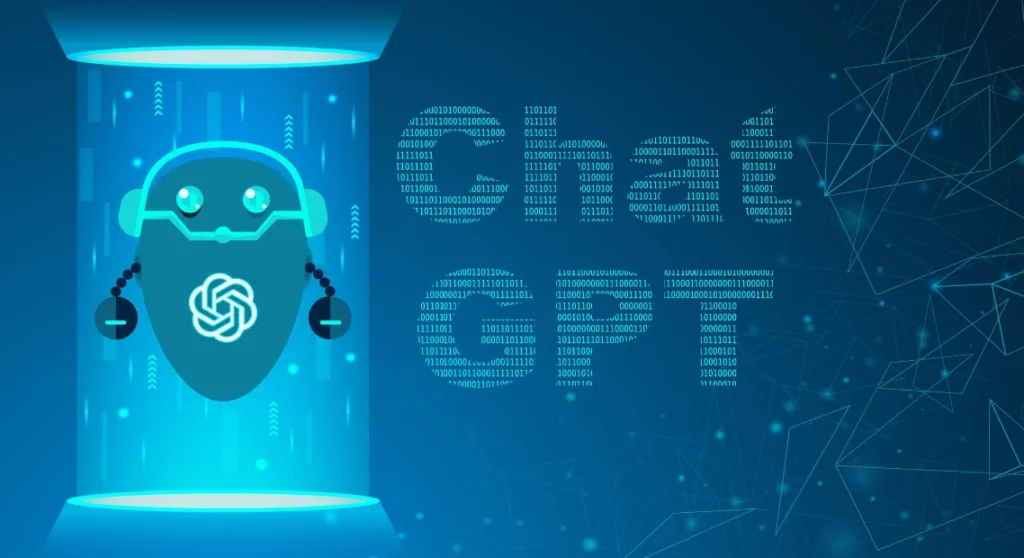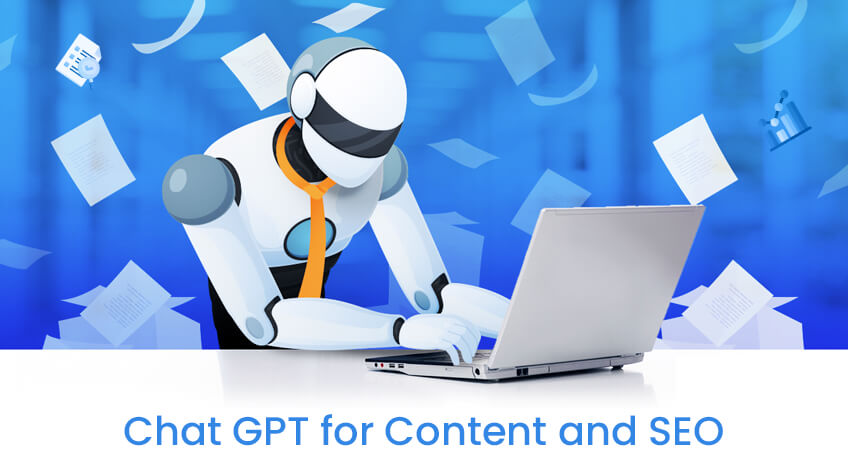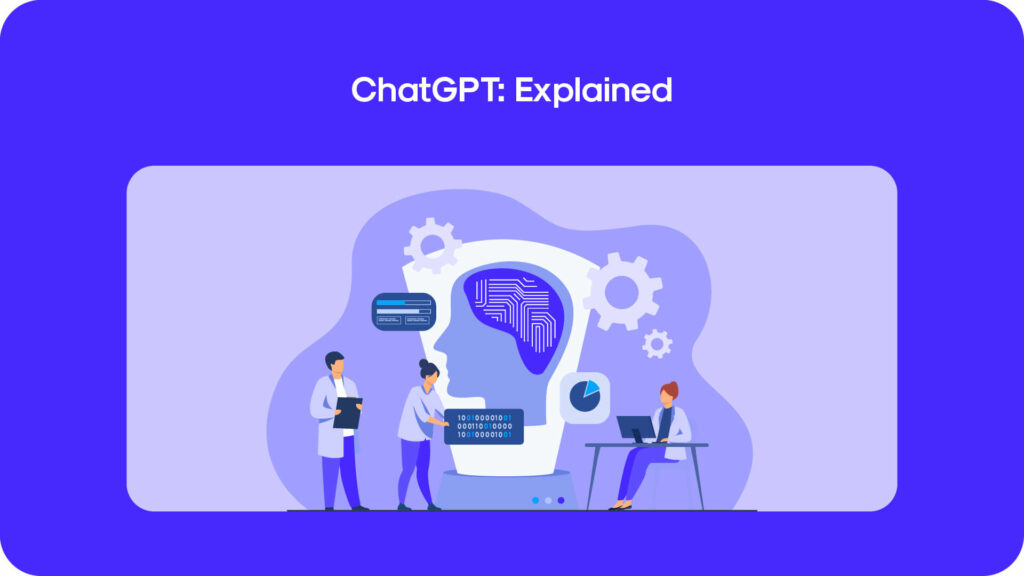
Artificial Intelligence (AI) is a powerful technology that is expanding at an incredible rate. Its uses are exponential across all industries. Far more than a trend, AI is fast becoming a cornerstone of many endeavors, including copywriting and SEO content creation. OpenAI’s ChatGPT is an advanced AI writing tool that generates as much praise as criticism. GPT stands for “Generative Pre-training Transformer.” Developed using OpenAI’s GPT-3 technology, ChatGPT is an AI model developed to generate human-like text. Released in 2022, ChatGPT is touted as a safe and beneficial AI copywriting system. The latest release includes reductions in “harmful and untruthful outputs,” which was accomplished through Reinforcement Learning from Human Feedback (RLHF). Note that it states a reduction in these negative outputs; it has not completely eliminated them.
This chatbot incorporates massive amounts of data from the web, which creates a general intelligence that enables it to carry on a human-like conversation, respond to questions, and write poetry, song lyrics, emails, recipes, and social media posts in various tones and voices. It can also write or edit code and supposedly perform many SEO functions.
ChatGPT for SEO Content Creation

Naturally, ChatGPT can assist bloggers and content creators with SEO content creation. For example, it can analyze keywords, create headlines, suggest blog topics, and create outlines or introductions up to approximately 500 words. However, it should be noted that any AI task should be completed with human oversight.
For keyword research, the user types a few target keywords and asks the chatbot for related terms. ChatGPT will produce a list of related keywords based on its search results. It can also suggest a good SEO title for your article. For SEO professionals, this poses some serious practical and ethical questions. Aside from quality issues, one must consider the fact that if it’s this easy to create content with AI, then competitors can do so just as easily. The result would be nearly identical articles and posts. Efficient, yes, but at what cost to quality? There are caveats to all the chatbox’s SEO functions, which we will discuss later in this article.
The central question is: Is ChatGPT beneficial for SEO content creation (blog articles in particular)?
The most straightforward answer to this question is: No.
And there are several reasons why, beginning with generated content that is incomplete, inconsistent, and often incorrect.

1. Incomplete Despite the Data
ChatGPT generates insights, though they are often incomplete despite access to an endless information network. Think about it for a moment. AI can search the net and develop intelligent content, though it cannot synthesize or customize that information with your organization’s mission or target audience. It can create keywords and related content. However, neither may correlate with your business. The resulting content won’t be unique to your website or even relevant to your audience. Ultimately, AI-generated keywords are poor choices for your SEO content strategies. They can’t tailor the content enough to match you or your audience.
Furthermore, Chat GPT comes up with keywords, though it doesn’t recognize which keywords may be difficult to rank for. Some keywords are too challenging for a newer website to rank for. You’d need to be strategic in selecting keywords that will drive ranking results depending on how well-established your site is, what your competitors are ranking for, and so on. So, you will still need to use another SEO tool to analyze the AI-generated keywords to ensure they are worthwhile. Chances are, the analysis will recommend that you either expand or refine your keywords in a manner that is beyond ChatGPT’s capabilities. In the end, using AI for keyword research and analysis is a wasted endeavor.
2. Inconsistent Accuracy
Inaccuracy is another known ChatGPT issue. ChatGPT language is assertive, though the data is sometimes incorrect, which is an incredible flaw. The software assembles readable content using sophisticated predictive text, similar to the autocomplete feature you use when text messaging. How many times did the predictive text on your phone create nonsensical statements? ChatGPT does the same, albeit more subtly. It may also generate code snippets with errors or list facts that aren’t entirely accurate.
If you use ChatGPT to create blog articles, you’ll have to build in a step to review and verify the data. Your readers may accept the content at face value, not realizing it was AI-generated. It may even sound credible and logical. The chatbot is programmed to phrase its language with an authoritative tone. However, predictive text programming leaves a wide margin for error. Without a thorough quality check, you would likely spread false information. This can undermine one of the basic SEO principles: establishing credibility and authority within your niche.
3. Lack of Contextualization
The incompleteness we discussed above relates to contextualization, which is something that remains lacking when using ChatGPT to generate content. Contextualized content is rooted in relevance. How is the information in your blog article relevant to your reader? More importantly, how is it relevant to them right now? Your marketing message should be engaging, informative, and valuable to the consumer.
In fact, many brands are producing content that qualifies as quality journalism to drive their media strategy. Newswires are valuable channels for building authority and connecting with customers where they consume news. This way, your content is more than useful; it plays a role in their everyday lives as news.
This trend towards contextualized marketing is effective, though it isn’t something ChatGPT factors in when generating keywords, blog post topics, or other content types. As a result, your blog articles miss the mark on quality as well as relevance.
ChatGPT cannot identify innovation or current events from its own queries. It’s a definitive blind spot in the chatbot’s capabilities. So, it cannot contextualize the data it is collecting and assembling for the requested content.
4. Outdated Content by Design
By design, ChatGPT content is outdated seconds after it’s created. Remember that ChatGPT works by assimilating existing information. That information may be recently published, though it may not be the most current information for the given topic. Thus, none of the content is completely current. This exacerbates the challenge presented above regarding contextualized marking. Presenting your audience with outdated information is neither relevant nor useful. They cannot take action based on old content.
It also degrades your keyword research. Choosing keywords based on metrics from several months or even a few years ago is unwise because it won’t reflect current trends or keyword values. With ChatGPT, that is the expected age of the data being gathered. In SEO terms, weeks-old data can be considered useless, setting your SEO results back.
5. Unoriginal Content
Because ChatGPT assimilates existing information, the output cannot be completely original. The AI tool is designed to restructure and reword existing content so that it is technically new content. New, but not necessarily original. It certainly can’t create any original reporting, research, or analyses. Even if it could, the problem would be the validity of that information.
Although Chat GPT is considered AI, it functions like a trained machine learning algorithm. The GPT-3 algorithm upon which Chat GPT is built is a trained deep-learning neural network. This means it predicts the next word in any given piece of content. So, it’s only as good as the data that it gathers. Considering the data is crawled web content, quality and even factual accuracy are in question. When ChatGPT creates content for a topic, it pulls from a repository of existing web content, scraping those search results together to match whatever parameter you set as filters.
One of the basic tenets of SEO is originality. Great content should introduce something new and unique, and subsequently create a fresh experience for the reader. While AI may be able to assist in that area, it’s not possible to create original, tailored content by AI alone. Since your goal is to rank higher than your competitors, originality is crucial. Duplicating content is sure to backfire because Google recognizes duplicate content. At a minimum, your page won’t be indexed. Worse, Google will penalize you for assumedly stealing content.
If AI restructures or rewrites other content in a way that improves the original, you will avoid penalty. However, the quality of the content may suffer nonetheless. Without said quality, the content won’t do you much good.
What if everyone adopted Chat GPT? Then, the regurgitated content would become an underperforming, homogeneous standard. At that point, the only way to rank higher than your competitors would be through technical SEO and backlinking.
6. Google’s Stance on AI-Generated Content
Currently, Google neither bans nor discourages AI-generated content. It is uncertain how they will regulate the use of chatbots in the future. They are maintaining their current protocols to rank poor-quality content lower in search results regardless of how it is generated.
Nonetheless, Google is already on alert over the latest ChatGPT release and its rising popularity. In addition to the problems it creates for SEO, the technology itself has some disturbing glitches. For instance, the bot does not fact-check its content. It can’t distinguish between valid facts and misinformation. Additionally, it can make up answers, which risks creating odd untruths and presenting them as facts. In addition, Chat GPT can generate racist, sexist, and otherwise offensive responses.
This high margin of error has prompted Google to delay releasing its own AI chatbot, Language Model for Dialogue Applications (LaMDA). Presently, chatbots aren’t reliable to use on a daily basis, especially not for content creation.
Google continues to research and develop AI products and continues to refine its search engine algorithms as well. Using AI chatbots, specifically ChatGPT search, presents a challenge for search engines. There is even talk that the technology could replace search engines, given its ability to cull through massive amounts of data, as search engines do. This would impact Google’s ad-revenue business model as well as how the world searches the internet for information.
What IS ChatGPT Good for?
While ChatGPT may be bad for SEO, it does have its uses for content creation. It’s a great tool for generating ideas and brainstorming topics. As stated, it does create blog topic ideas for you, as well as suggest keywords. While you must still analyze and refine those suggestions to fit your SEO strategy, it will generate results you would not have thought of on your own brainpower.
Chat GPT is also helpful for organizing your article. While you strive for originality, blog articles often follow a similar structure, and ChatGPT will capture that. While you should be wary of using the generated content, you can refer to it as a suggested outline for your original article. You can even use your own gathered research and have the chatbot create the content outline for you.
Keep in mind, however, that ChatGPT shouldn’t take the place of SEO keyword research tools like Semrush and Ahrefs. These tools are designed specifically for SEO, featuring advanced filters to narrow your search results and target the right audience for your content marketing plans.
Also, ChatGPT does have its uses for creating other types of more dispensable content, like social media posts and ad copy. These types of content are brief and to the point. Originality and contextualization aren’t driving factors as they are with SEO blog articles and web copy. Keywords are needed, but they are much simpler to identify and select.
ChatGPT Risk Outweighs Its SEO Value
In summary, the slight benefits of AI-based content do not compare with its disadvantages when it comes to SEO. While it is easier and faster to generate new content for websites and blogs, the content is based on information that is already available. This calls originality and relevance into question, making the resulting content rank lower on Google. Blog content must be well-crafted (and human-written) so that it establishes credibility and distinguishes your brand.
Indeed, ChatGPT is changing how people search and work. In fact, it has changed how people search for information altogether. Google and the other search engines are prioritizing their proprietary AI technologies as well as defining how they will address SEO for AI-created content.
For now, content creators should consider AI a secondary source for SEO content creation. The human mind remains the best authoring tool for SEO content, so to speak. ChatGPT and related chatbots have their place as supporting tools.
At Searched & Found, we have some of the best creative minds in the industry to help you create original, compelling SEO content that will rank. Check out our SEO services page to learn more.